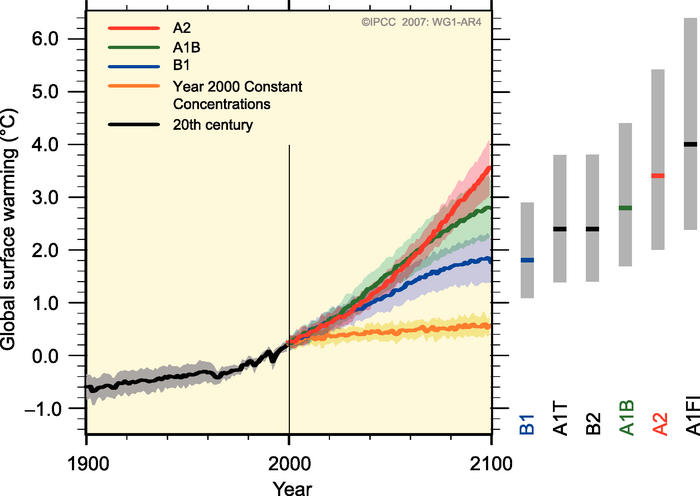CO2 Reductions Will Not Cool the Planet? We Know
Posted on 21 April 2011 by grypo
In a blog post by Andrew Bolt, Tim Flannery, the Australian Chief Climate Commissioner, was quoted as saying the following:
"Just let me finish and say this. If the world as a whole cut all emissions tomorrow the average temperature of the planet is not going to drop in several hundred years, perhaps as much as 1000 years because the system is overburdened with CO2 that has to be absorbed..."
This idea was repeated as a line of reasoning to not act on climate change by Austrailian Parliament member Tony Abbott:
"So this is a government which is proposing to put at risk our manufacturing industry, to penalise struggling families, to make a tough situation worse for millions of households right around Australia. And for what? To make not a scrap of difference to the environment any time in the next 1000 years."
These skeptics have argued that if reductions in CO2 will not cool the planet for hundreds of years, then it is not prudent to cut emissions and put any burden on a fossil-fuel-driven economy. But does this make sense?
Let's look at Tim Flannery's explanation for his statement, from a segment of the letter to the editor of Weekend Australian:
"The Australian reported correctly that I responded by saying that if humanity ceased emitting greenhouse gases tomorrow, it would take centuries for their concentration in the atmosphere to return to pre-industrial (1800 AD) levels. This is, however, not an argument for complacency, or abandoning the target. Rather, it highlights the importance of avoiding every kilogram of greenhouse gas emissions we can, for once in the atmosphere, they are extremely difficult to get out, and have long-term consequences."
Professor Tim Flannery, Chief Climate Commissioner
A choice between sustained temperature increase and doing nothing is not, unfortunately, the choice we are facing. The real choice we face is between decreasing CO2 emissions (in which case temperatures will still warm a bit more and then stabilize), and letting CO2 emissions go on and on (in which case temperatures will continue to rise and rise). In the future, when technologically and economically feasible, it may be possible to withdraw carbon from the atmosphere, perhaps with increasing tree growth or chemical "scrubbing". But this is just a goal for the future.
According the IPCC, from the Summary for Policy Makers:
- Continued greenhouse gas emissions at or above current rates would cause further warming and induce many changes in the global climate system during the 21st century that would very likely be larger than those observed during the 20th century.
- Anthropogenic warming and sea level rise would continue for centuries due to the time scales associated with climate processes and feedbacks, even if greenhouse gas concentrations were to be stabilised.

Global surface temperature projections for IPCC Scenarios. Shading denotes the ±1 standard deviation range of individual model annual averages. The orange line is constant CO2 concentrations at year 2000 values. The grey bars at right indicate the best estimate (solid line within each bar) and the likely range. (Source: IPCC). Emission scenarios
This is one skeptic argument where one must wonder if some of those who wish to prevent action on climate change really understand what the argument is about.
NOTE: this post is also the Basic rebuttal to "CO2 limits won't cool the planet"































 Arguments
Arguments























 0
0  0
0






Comments